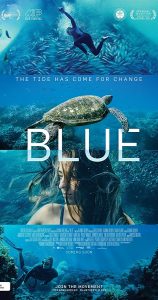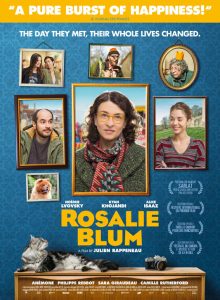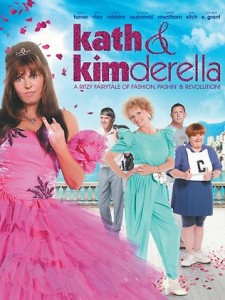Blue is a series of provocative vignettes on the state of our oceans. Director Karina Holden delivers a wake-up call for all of us on how dire the situation is, and why we’re in this position to begin with. Some of the information is obvious, there is plenty that is enlightening, and nearly all of the film is confronting.
Our oceans are under tremendous strain supplying the resources necessary for a bloated humanity. Most of us know that. For the most part however, this isn’t a science lesson, or even a lecture. The film takes us on several small journeys through the various expertise of scientists and conservationists around the globe. Each expert stars and narrates one of six featurettes.
The featurettes range in quality and emotional impact, however they all are shot as beautifully as you can expect. The figurehead of the film, Madison Stewart, opens the film and sets the tone with a piece on sharks and over fishing. She is an idealistic woman consumed with passion but lacking scientific qualifications. Her piece opens melodramatically as she walks through an impoverished village espousing her love of the ocean and sharks in particular. The image of a privileged westerner criticising and moralising the behaviors of the destitute isn’t perhaps the best opening for the film. Later in the piece we get to the graphic imagery of sharks being definned and their bodies going to waste. It’s bleak and unjust but not on the same impact level as The Cove.
The vignettes following the mixed introductory piece are the real deal however. These include qualified subjects and orators, with a backbone of figures and numbers to accompany the confronting pictures on screen. The film opts not to go too deep down the rabbit hole of climate change, although of course mentions coral bleaching. There is plenty to say on over fishing, unsustainable and illegal fishing, the literal tonnes of discarded netting and rope drowning turtles and sea mammals, and there is plenty of light shed on the insidious effects of plastics in bioecology.
One of the middle vignettes is perhaps the most powerful. Jennifer Lavers, marine ecotoxicologist, has devoted her life to island birds. They are adorable. In the dead of night she captures one to induce vomiting. With mounting horror the torch light illuminates dozens of pieces of plastic in the bile. This bird isn’t unique; every bird she finds has some plastic content in its stomach now. It’s a recent development and the amount is trending upwards. Seeing the bottle cap inserts and wall plugs regurgitated from a distressed infant is moving to say the least. It’s even more distressing to learn that our plastic is being slowly eroded into tinier pieces and entering the food chain at the base with krill consuming the smallest concentrations of it.
There is a range of different emotions that will wash over viewers as they watch this film: discomfort, guilt, grief, and a little hope to end things with. I would recommend typing the key words ‘turtle’ and ‘straw’ into YouTube for a condensed version of the emotions this film will move you to. This documentary serves to enlighten and hopefully change some values. Its ideas are powerful and hopefully a film like this can go the distance to change attitudes and eventually practices. The ideal audience to consume this film is in classrooms. Blue is a dry documentary alternating between emotional and cerebral. It may not be entirely entertaining, but it’s incredibly poignant.
Blue is in cinemas from 12th October through Transmission Films.





